PSY2COG Essay: Cognitive Effects of Schizophrenia - University Name
VerifiedAdded on 2022/11/26
|9
|2417
|428
Essay
AI Summary
This essay provides a comprehensive analysis of the cognitive effects of schizophrenia, examining the impact of the disorder on various cognitive domains. It critically evaluates existing literature to determine the extent of cognitive impairment in individuals with schizophrenia, focusing on areas such as attention, memory, and social cognition. The essay synthesizes research findings from multiple studies, including cross-sectional studies, randomized control trials, and behavioral studies, to present a well-supported argument regarding the nature and severity of cognitive deficits. It explores the neurobiological underpinnings of these impairments, including the role of neurodevelopmental abnormalities and synaptic plasticity. Furthermore, the essay addresses the implications of cognitive deficits for daily functioning and discusses potential treatment approaches, such as cognitive remediation programs and psychotherapy. The essay highlights the importance of understanding cognitive impairments in schizophrenia for improving patient outcomes and developing effective interventions. The essay references various research papers and studies to support the arguments presented.
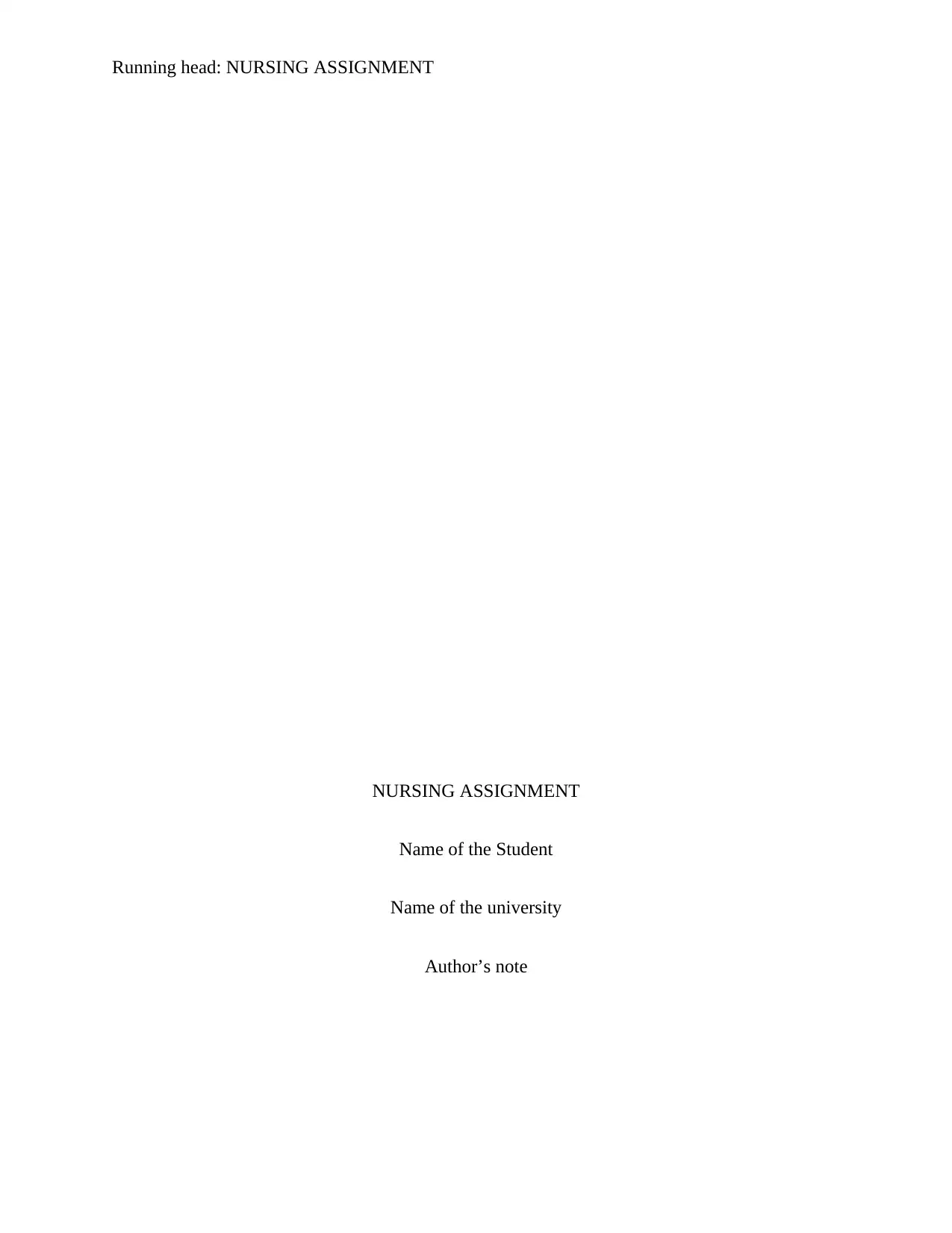
Running head: NURSING ASSIGNMENT
NURSING ASSIGNMENT
Name of the Student
Name of the university
Author’s note
NURSING ASSIGNMENT
Name of the Student
Name of the university
Author’s note
Paraphrase This Document
Need a fresh take? Get an instant paraphrase of this document with our AI Paraphraser
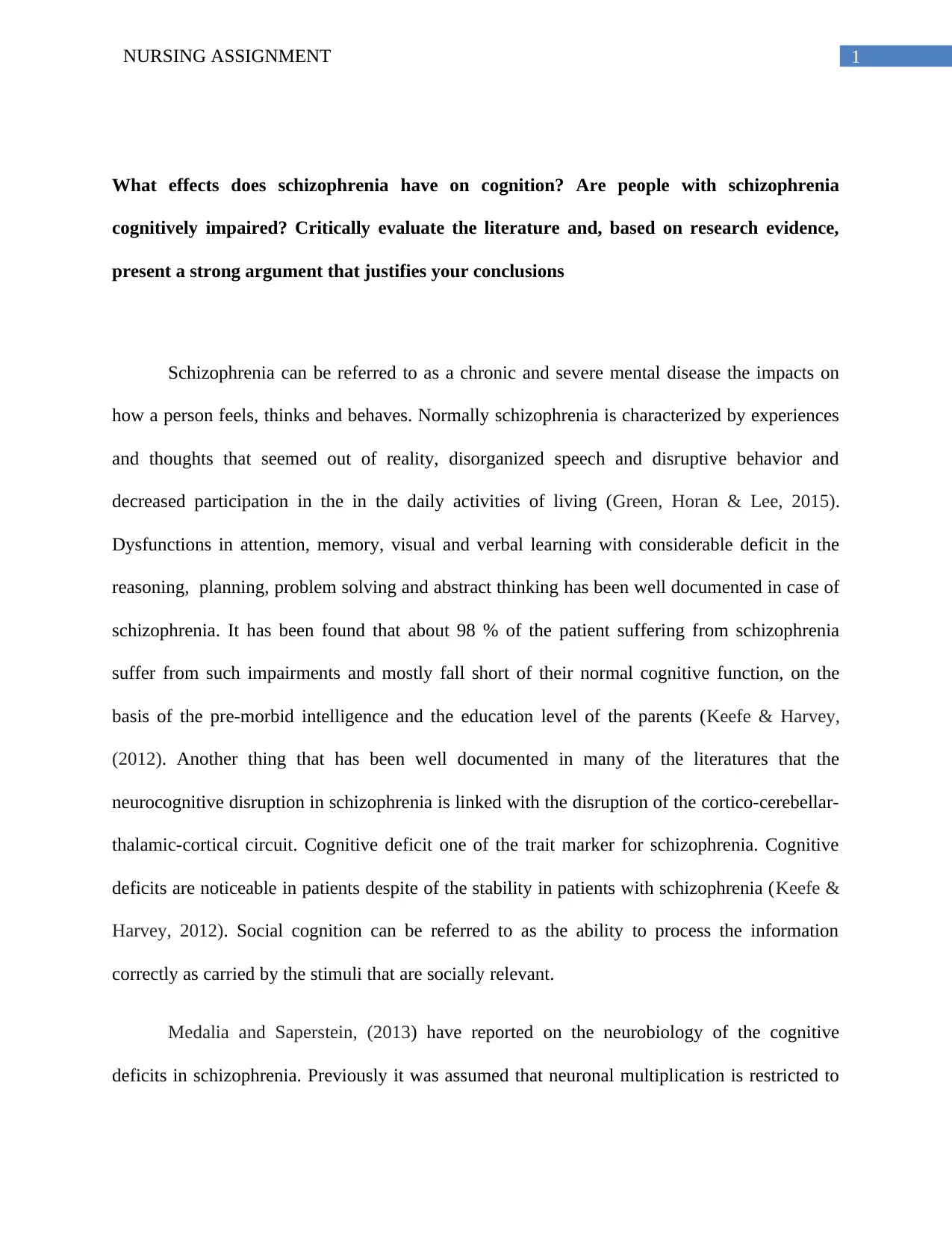
1NURSING ASSIGNMENT
What effects does schizophrenia have on cognition? Are people with schizophrenia
cognitively impaired? Critically evaluate the literature and, based on research evidence,
present a strong argument that justifies your conclusions
Schizophrenia can be referred to as a chronic and severe mental disease the impacts on
how a person feels, thinks and behaves. Normally schizophrenia is characterized by experiences
and thoughts that seemed out of reality, disorganized speech and disruptive behavior and
decreased participation in the in the daily activities of living (Green, Horan & Lee, 2015).
Dysfunctions in attention, memory, visual and verbal learning with considerable deficit in the
reasoning, planning, problem solving and abstract thinking has been well documented in case of
schizophrenia. It has been found that about 98 % of the patient suffering from schizophrenia
suffer from such impairments and mostly fall short of their normal cognitive function, on the
basis of the pre-morbid intelligence and the education level of the parents (Keefe & Harvey,
(2012). Another thing that has been well documented in many of the literatures that the
neurocognitive disruption in schizophrenia is linked with the disruption of the cortico-cerebellar-
thalamic-cortical circuit. Cognitive deficit one of the trait marker for schizophrenia. Cognitive
deficits are noticeable in patients despite of the stability in patients with schizophrenia (Keefe &
Harvey, 2012). Social cognition can be referred to as the ability to process the information
correctly as carried by the stimuli that are socially relevant.
Medalia and Saperstein, (2013) have reported on the neurobiology of the cognitive
deficits in schizophrenia. Previously it was assumed that neuronal multiplication is restricted to
What effects does schizophrenia have on cognition? Are people with schizophrenia
cognitively impaired? Critically evaluate the literature and, based on research evidence,
present a strong argument that justifies your conclusions
Schizophrenia can be referred to as a chronic and severe mental disease the impacts on
how a person feels, thinks and behaves. Normally schizophrenia is characterized by experiences
and thoughts that seemed out of reality, disorganized speech and disruptive behavior and
decreased participation in the in the daily activities of living (Green, Horan & Lee, 2015).
Dysfunctions in attention, memory, visual and verbal learning with considerable deficit in the
reasoning, planning, problem solving and abstract thinking has been well documented in case of
schizophrenia. It has been found that about 98 % of the patient suffering from schizophrenia
suffer from such impairments and mostly fall short of their normal cognitive function, on the
basis of the pre-morbid intelligence and the education level of the parents (Keefe & Harvey,
(2012). Another thing that has been well documented in many of the literatures that the
neurocognitive disruption in schizophrenia is linked with the disruption of the cortico-cerebellar-
thalamic-cortical circuit. Cognitive deficit one of the trait marker for schizophrenia. Cognitive
deficits are noticeable in patients despite of the stability in patients with schizophrenia (Keefe &
Harvey, 2012). Social cognition can be referred to as the ability to process the information
correctly as carried by the stimuli that are socially relevant.
Medalia and Saperstein, (2013) have reported on the neurobiology of the cognitive
deficits in schizophrenia. Previously it was assumed that neuronal multiplication is restricted to
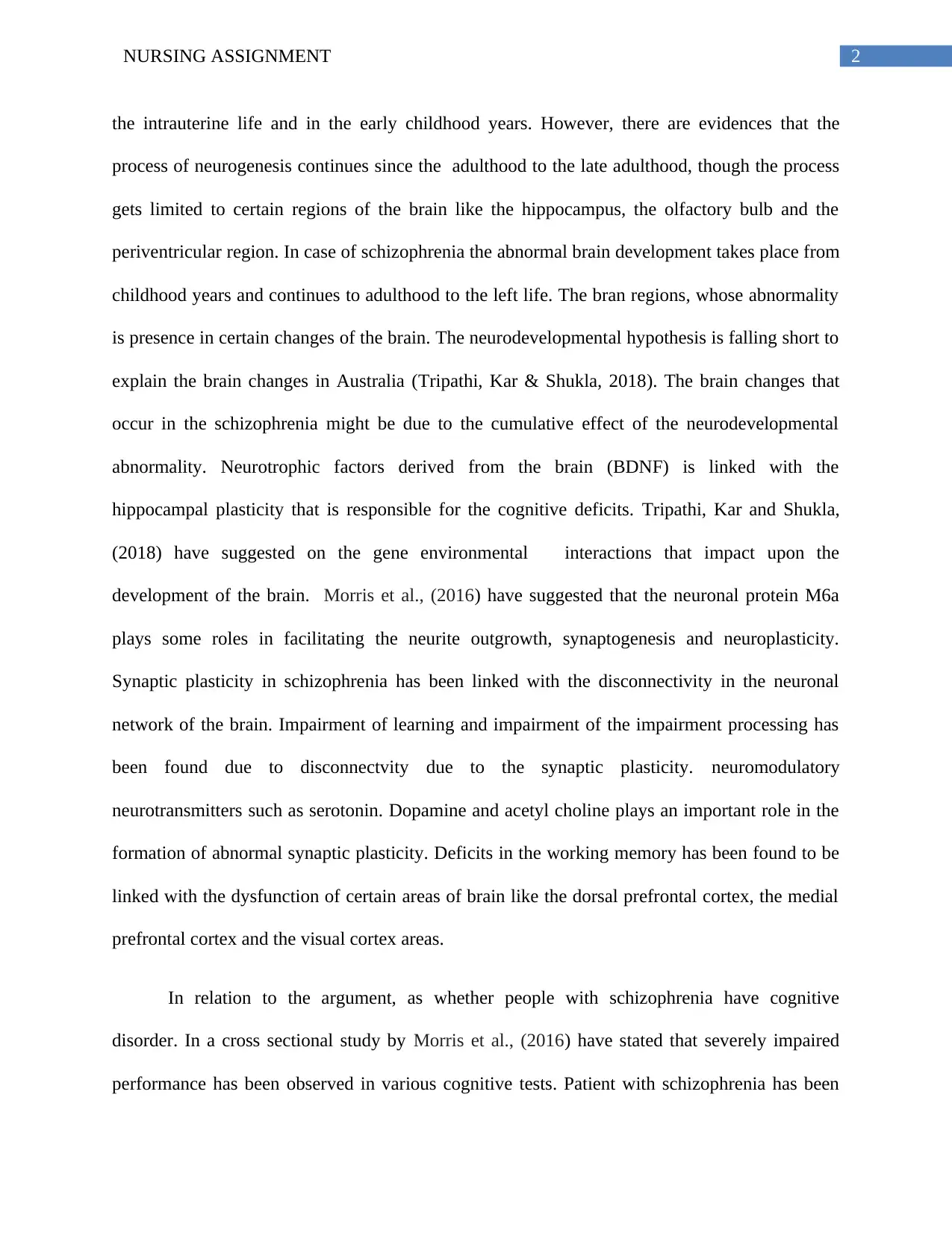
2NURSING ASSIGNMENT
the intrauterine life and in the early childhood years. However, there are evidences that the
process of neurogenesis continues since the adulthood to the late adulthood, though the process
gets limited to certain regions of the brain like the hippocampus, the olfactory bulb and the
periventricular region. In case of schizophrenia the abnormal brain development takes place from
childhood years and continues to adulthood to the left life. The bran regions, whose abnormality
is presence in certain changes of the brain. The neurodevelopmental hypothesis is falling short to
explain the brain changes in Australia (Tripathi, Kar & Shukla, 2018). The brain changes that
occur in the schizophrenia might be due to the cumulative effect of the neurodevelopmental
abnormality. Neurotrophic factors derived from the brain (BDNF) is linked with the
hippocampal plasticity that is responsible for the cognitive deficits. Tripathi, Kar and Shukla,
(2018) have suggested on the gene environmental interactions that impact upon the
development of the brain. Morris et al., (2016) have suggested that the neuronal protein M6a
plays some roles in facilitating the neurite outgrowth, synaptogenesis and neuroplasticity.
Synaptic plasticity in schizophrenia has been linked with the disconnectivity in the neuronal
network of the brain. Impairment of learning and impairment of the impairment processing has
been found due to disconnectvity due to the synaptic plasticity. neuromodulatory
neurotransmitters such as serotonin. Dopamine and acetyl choline plays an important role in the
formation of abnormal synaptic plasticity. Deficits in the working memory has been found to be
linked with the dysfunction of certain areas of brain like the dorsal prefrontal cortex, the medial
prefrontal cortex and the visual cortex areas.
In relation to the argument, as whether people with schizophrenia have cognitive
disorder. In a cross sectional study by Morris et al., (2016) have stated that severely impaired
performance has been observed in various cognitive tests. Patient with schizophrenia has been
the intrauterine life and in the early childhood years. However, there are evidences that the
process of neurogenesis continues since the adulthood to the late adulthood, though the process
gets limited to certain regions of the brain like the hippocampus, the olfactory bulb and the
periventricular region. In case of schizophrenia the abnormal brain development takes place from
childhood years and continues to adulthood to the left life. The bran regions, whose abnormality
is presence in certain changes of the brain. The neurodevelopmental hypothesis is falling short to
explain the brain changes in Australia (Tripathi, Kar & Shukla, 2018). The brain changes that
occur in the schizophrenia might be due to the cumulative effect of the neurodevelopmental
abnormality. Neurotrophic factors derived from the brain (BDNF) is linked with the
hippocampal plasticity that is responsible for the cognitive deficits. Tripathi, Kar and Shukla,
(2018) have suggested on the gene environmental interactions that impact upon the
development of the brain. Morris et al., (2016) have suggested that the neuronal protein M6a
plays some roles in facilitating the neurite outgrowth, synaptogenesis and neuroplasticity.
Synaptic plasticity in schizophrenia has been linked with the disconnectivity in the neuronal
network of the brain. Impairment of learning and impairment of the impairment processing has
been found due to disconnectvity due to the synaptic plasticity. neuromodulatory
neurotransmitters such as serotonin. Dopamine and acetyl choline plays an important role in the
formation of abnormal synaptic plasticity. Deficits in the working memory has been found to be
linked with the dysfunction of certain areas of brain like the dorsal prefrontal cortex, the medial
prefrontal cortex and the visual cortex areas.
In relation to the argument, as whether people with schizophrenia have cognitive
disorder. In a cross sectional study by Morris et al., (2016) have stated that severely impaired
performance has been observed in various cognitive tests. Patient with schizophrenia has been
⊘ This is a preview!⊘
Do you want full access?
Subscribe today to unlock all pages.

Trusted by 1+ million students worldwide
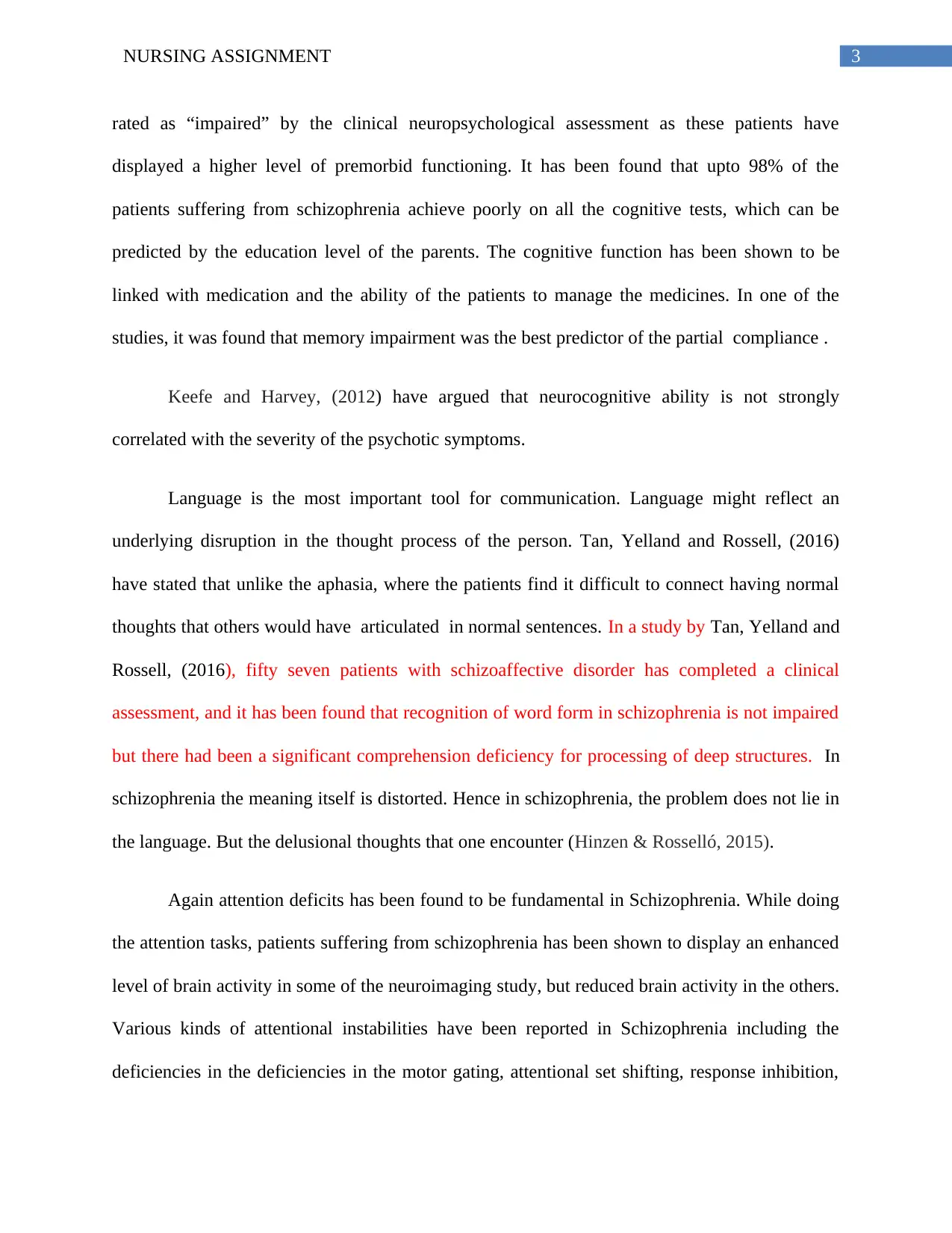
3NURSING ASSIGNMENT
rated as “impaired” by the clinical neuropsychological assessment as these patients have
displayed a higher level of premorbid functioning. It has been found that upto 98% of the
patients suffering from schizophrenia achieve poorly on all the cognitive tests, which can be
predicted by the education level of the parents. The cognitive function has been shown to be
linked with medication and the ability of the patients to manage the medicines. In one of the
studies, it was found that memory impairment was the best predictor of the partial compliance .
Keefe and Harvey, (2012) have argued that neurocognitive ability is not strongly
correlated with the severity of the psychotic symptoms.
Language is the most important tool for communication. Language might reflect an
underlying disruption in the thought process of the person. Tan, Yelland and Rossell, (2016)
have stated that unlike the aphasia, where the patients find it difficult to connect having normal
thoughts that others would have articulated in normal sentences. In a study by Tan, Yelland and
Rossell, (2016), fifty seven patients with schizoaffective disorder has completed a clinical
assessment, and it has been found that recognition of word form in schizophrenia is not impaired
but there had been a significant comprehension deficiency for processing of deep structures. In
schizophrenia the meaning itself is distorted. Hence in schizophrenia, the problem does not lie in
the language. But the delusional thoughts that one encounter (Hinzen & Rosselló, 2015).
Again attention deficits has been found to be fundamental in Schizophrenia. While doing
the attention tasks, patients suffering from schizophrenia has been shown to display an enhanced
level of brain activity in some of the neuroimaging study, but reduced brain activity in the others.
Various kinds of attentional instabilities have been reported in Schizophrenia including the
deficiencies in the deficiencies in the motor gating, attentional set shifting, response inhibition,
rated as “impaired” by the clinical neuropsychological assessment as these patients have
displayed a higher level of premorbid functioning. It has been found that upto 98% of the
patients suffering from schizophrenia achieve poorly on all the cognitive tests, which can be
predicted by the education level of the parents. The cognitive function has been shown to be
linked with medication and the ability of the patients to manage the medicines. In one of the
studies, it was found that memory impairment was the best predictor of the partial compliance .
Keefe and Harvey, (2012) have argued that neurocognitive ability is not strongly
correlated with the severity of the psychotic symptoms.
Language is the most important tool for communication. Language might reflect an
underlying disruption in the thought process of the person. Tan, Yelland and Rossell, (2016)
have stated that unlike the aphasia, where the patients find it difficult to connect having normal
thoughts that others would have articulated in normal sentences. In a study by Tan, Yelland and
Rossell, (2016), fifty seven patients with schizoaffective disorder has completed a clinical
assessment, and it has been found that recognition of word form in schizophrenia is not impaired
but there had been a significant comprehension deficiency for processing of deep structures. In
schizophrenia the meaning itself is distorted. Hence in schizophrenia, the problem does not lie in
the language. But the delusional thoughts that one encounter (Hinzen & Rosselló, 2015).
Again attention deficits has been found to be fundamental in Schizophrenia. While doing
the attention tasks, patients suffering from schizophrenia has been shown to display an enhanced
level of brain activity in some of the neuroimaging study, but reduced brain activity in the others.
Various kinds of attentional instabilities have been reported in Schizophrenia including the
deficiencies in the deficiencies in the motor gating, attentional set shifting, response inhibition,
Paraphrase This Document
Need a fresh take? Get an instant paraphrase of this document with our AI Paraphraser
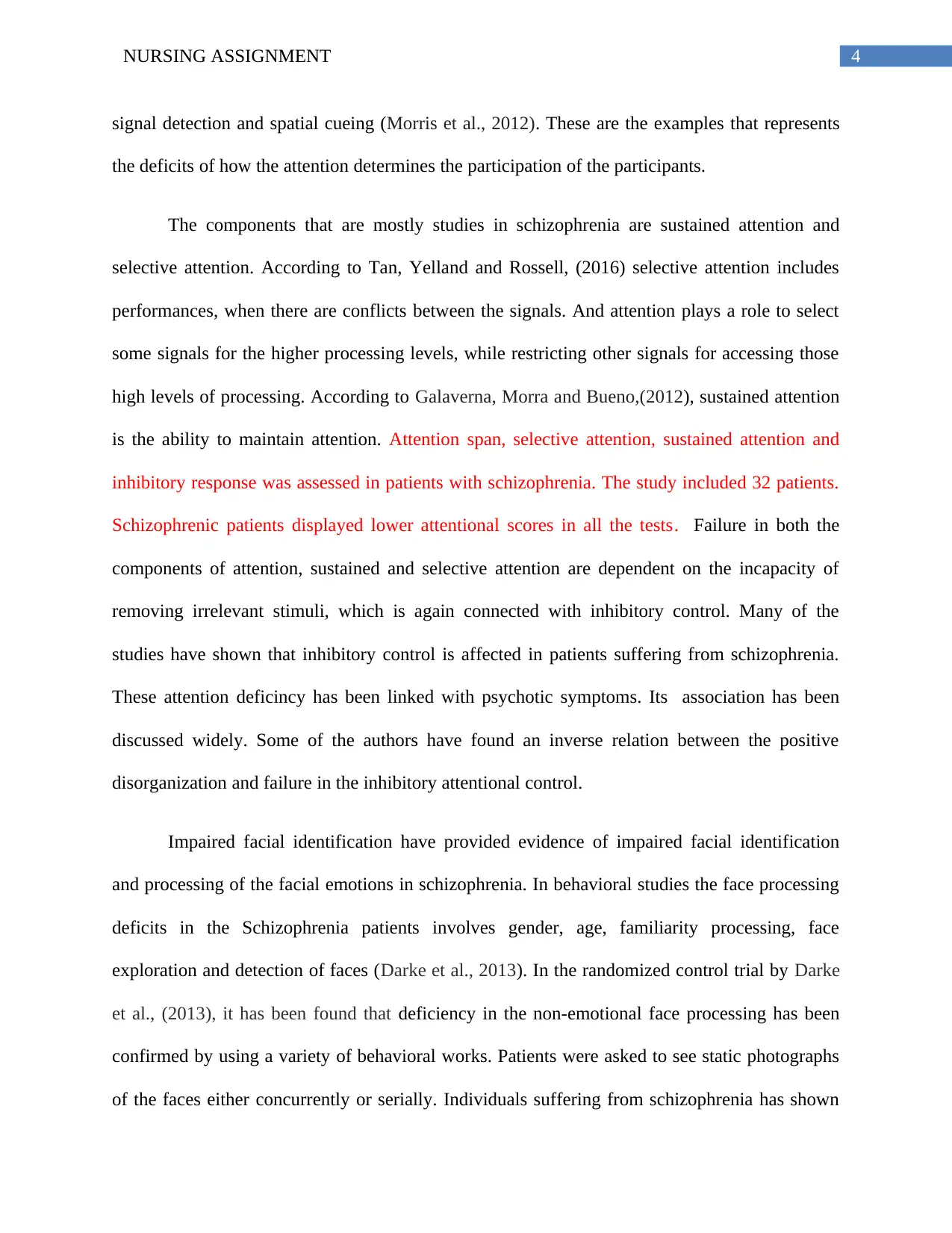
4NURSING ASSIGNMENT
signal detection and spatial cueing (Morris et al., 2012). These are the examples that represents
the deficits of how the attention determines the participation of the participants.
The components that are mostly studies in schizophrenia are sustained attention and
selective attention. According to Tan, Yelland and Rossell, (2016) selective attention includes
performances, when there are conflicts between the signals. And attention plays a role to select
some signals for the higher processing levels, while restricting other signals for accessing those
high levels of processing. According to Galaverna, Morra and Bueno,(2012), sustained attention
is the ability to maintain attention. Attention span, selective attention, sustained attention and
inhibitory response was assessed in patients with schizophrenia. The study included 32 patients.
Schizophrenic patients displayed lower attentional scores in all the tests. Failure in both the
components of attention, sustained and selective attention are dependent on the incapacity of
removing irrelevant stimuli, which is again connected with inhibitory control. Many of the
studies have shown that inhibitory control is affected in patients suffering from schizophrenia.
These attention deficincy has been linked with psychotic symptoms. Its association has been
discussed widely. Some of the authors have found an inverse relation between the positive
disorganization and failure in the inhibitory attentional control.
Impaired facial identification have provided evidence of impaired facial identification
and processing of the facial emotions in schizophrenia. In behavioral studies the face processing
deficits in the Schizophrenia patients involves gender, age, familiarity processing, face
exploration and detection of faces (Darke et al., 2013). In the randomized control trial by Darke
et al., (2013), it has been found that deficiency in the non-emotional face processing has been
confirmed by using a variety of behavioral works. Patients were asked to see static photographs
of the faces either concurrently or serially. Individuals suffering from schizophrenia has shown
signal detection and spatial cueing (Morris et al., 2012). These are the examples that represents
the deficits of how the attention determines the participation of the participants.
The components that are mostly studies in schizophrenia are sustained attention and
selective attention. According to Tan, Yelland and Rossell, (2016) selective attention includes
performances, when there are conflicts between the signals. And attention plays a role to select
some signals for the higher processing levels, while restricting other signals for accessing those
high levels of processing. According to Galaverna, Morra and Bueno,(2012), sustained attention
is the ability to maintain attention. Attention span, selective attention, sustained attention and
inhibitory response was assessed in patients with schizophrenia. The study included 32 patients.
Schizophrenic patients displayed lower attentional scores in all the tests. Failure in both the
components of attention, sustained and selective attention are dependent on the incapacity of
removing irrelevant stimuli, which is again connected with inhibitory control. Many of the
studies have shown that inhibitory control is affected in patients suffering from schizophrenia.
These attention deficincy has been linked with psychotic symptoms. Its association has been
discussed widely. Some of the authors have found an inverse relation between the positive
disorganization and failure in the inhibitory attentional control.
Impaired facial identification have provided evidence of impaired facial identification
and processing of the facial emotions in schizophrenia. In behavioral studies the face processing
deficits in the Schizophrenia patients involves gender, age, familiarity processing, face
exploration and detection of faces (Darke et al., 2013). In the randomized control trial by Darke
et al., (2013), it has been found that deficiency in the non-emotional face processing has been
confirmed by using a variety of behavioral works. Patients were asked to see static photographs
of the faces either concurrently or serially. Individuals suffering from schizophrenia has shown
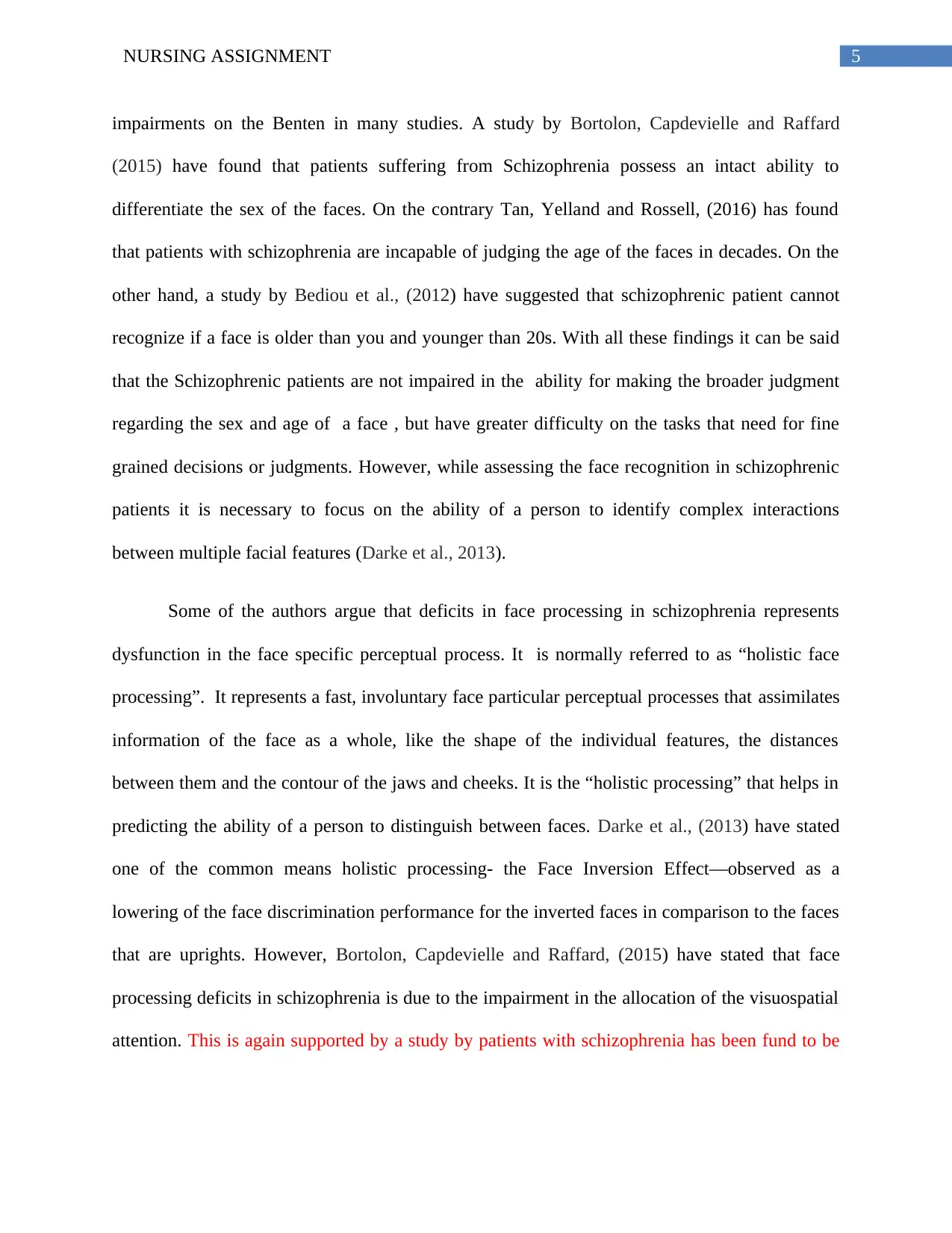
5NURSING ASSIGNMENT
impairments on the Benten in many studies. A study by Bortolon, Capdevielle and Raffard
(2015) have found that patients suffering from Schizophrenia possess an intact ability to
differentiate the sex of the faces. On the contrary Tan, Yelland and Rossell, (2016) has found
that patients with schizophrenia are incapable of judging the age of the faces in decades. On the
other hand, a study by Bediou et al., (2012) have suggested that schizophrenic patient cannot
recognize if a face is older than you and younger than 20s. With all these findings it can be said
that the Schizophrenic patients are not impaired in the ability for making the broader judgment
regarding the sex and age of a face , but have greater difficulty on the tasks that need for fine
grained decisions or judgments. However, while assessing the face recognition in schizophrenic
patients it is necessary to focus on the ability of a person to identify complex interactions
between multiple facial features (Darke et al., 2013).
Some of the authors argue that deficits in face processing in schizophrenia represents
dysfunction in the face specific perceptual process. It is normally referred to as “holistic face
processing”. It represents a fast, involuntary face particular perceptual processes that assimilates
information of the face as a whole, like the shape of the individual features, the distances
between them and the contour of the jaws and cheeks. It is the “holistic processing” that helps in
predicting the ability of a person to distinguish between faces. Darke et al., (2013) have stated
one of the common means holistic processing- the Face Inversion Effect—observed as a
lowering of the face discrimination performance for the inverted faces in comparison to the faces
that are uprights. However, Bortolon, Capdevielle and Raffard, (2015) have stated that face
processing deficits in schizophrenia is due to the impairment in the allocation of the visuospatial
attention. This is again supported by a study by patients with schizophrenia has been fund to be
impairments on the Benten in many studies. A study by Bortolon, Capdevielle and Raffard
(2015) have found that patients suffering from Schizophrenia possess an intact ability to
differentiate the sex of the faces. On the contrary Tan, Yelland and Rossell, (2016) has found
that patients with schizophrenia are incapable of judging the age of the faces in decades. On the
other hand, a study by Bediou et al., (2012) have suggested that schizophrenic patient cannot
recognize if a face is older than you and younger than 20s. With all these findings it can be said
that the Schizophrenic patients are not impaired in the ability for making the broader judgment
regarding the sex and age of a face , but have greater difficulty on the tasks that need for fine
grained decisions or judgments. However, while assessing the face recognition in schizophrenic
patients it is necessary to focus on the ability of a person to identify complex interactions
between multiple facial features (Darke et al., 2013).
Some of the authors argue that deficits in face processing in schizophrenia represents
dysfunction in the face specific perceptual process. It is normally referred to as “holistic face
processing”. It represents a fast, involuntary face particular perceptual processes that assimilates
information of the face as a whole, like the shape of the individual features, the distances
between them and the contour of the jaws and cheeks. It is the “holistic processing” that helps in
predicting the ability of a person to distinguish between faces. Darke et al., (2013) have stated
one of the common means holistic processing- the Face Inversion Effect—observed as a
lowering of the face discrimination performance for the inverted faces in comparison to the faces
that are uprights. However, Bortolon, Capdevielle and Raffard, (2015) have stated that face
processing deficits in schizophrenia is due to the impairment in the allocation of the visuospatial
attention. This is again supported by a study by patients with schizophrenia has been fund to be
⊘ This is a preview!⊘
Do you want full access?
Subscribe today to unlock all pages.

Trusted by 1+ million students worldwide
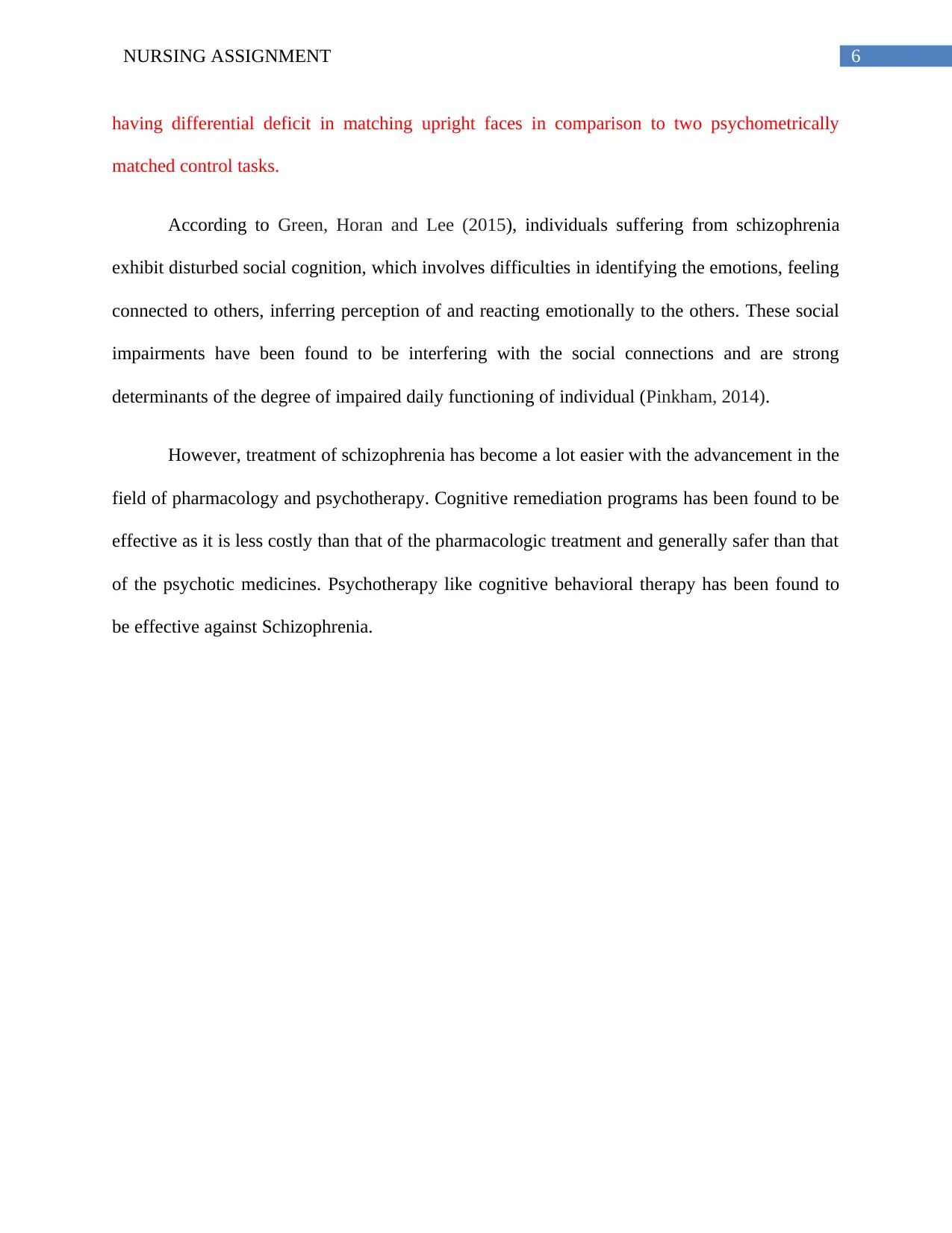
6NURSING ASSIGNMENT
having differential deficit in matching upright faces in comparison to two psychometrically
matched control tasks.
According to Green, Horan and Lee (2015), individuals suffering from schizophrenia
exhibit disturbed social cognition, which involves difficulties in identifying the emotions, feeling
connected to others, inferring perception of and reacting emotionally to the others. These social
impairments have been found to be interfering with the social connections and are strong
determinants of the degree of impaired daily functioning of individual (Pinkham, 2014).
However, treatment of schizophrenia has become a lot easier with the advancement in the
field of pharmacology and psychotherapy. Cognitive remediation programs has been found to be
effective as it is less costly than that of the pharmacologic treatment and generally safer than that
of the psychotic medicines. Psychotherapy like cognitive behavioral therapy has been found to
be effective against Schizophrenia.
having differential deficit in matching upright faces in comparison to two psychometrically
matched control tasks.
According to Green, Horan and Lee (2015), individuals suffering from schizophrenia
exhibit disturbed social cognition, which involves difficulties in identifying the emotions, feeling
connected to others, inferring perception of and reacting emotionally to the others. These social
impairments have been found to be interfering with the social connections and are strong
determinants of the degree of impaired daily functioning of individual (Pinkham, 2014).
However, treatment of schizophrenia has become a lot easier with the advancement in the
field of pharmacology and psychotherapy. Cognitive remediation programs has been found to be
effective as it is less costly than that of the pharmacologic treatment and generally safer than that
of the psychotic medicines. Psychotherapy like cognitive behavioral therapy has been found to
be effective against Schizophrenia.
Paraphrase This Document
Need a fresh take? Get an instant paraphrase of this document with our AI Paraphraser
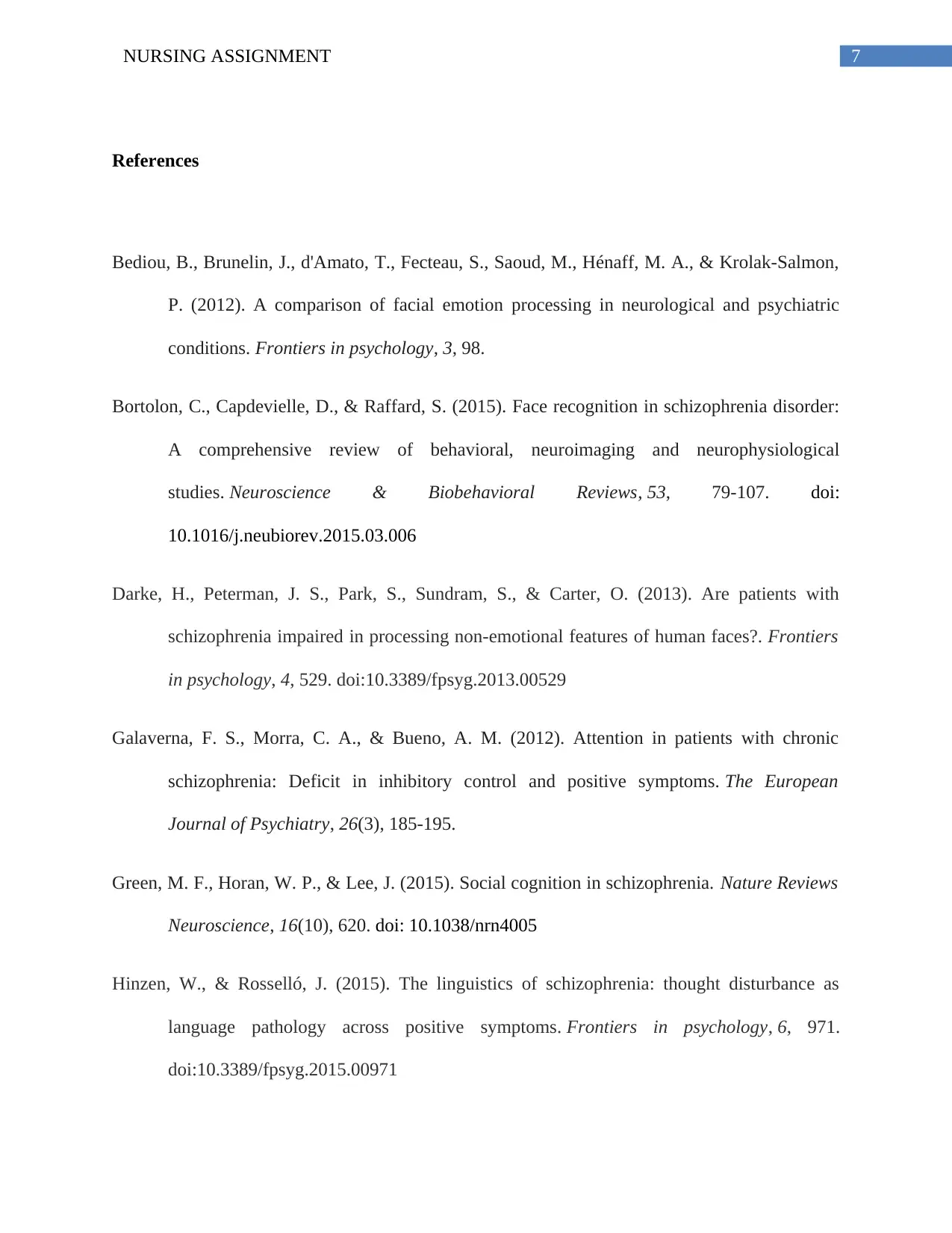
7NURSING ASSIGNMENT
References
Bediou, B., Brunelin, J., d'Amato, T., Fecteau, S., Saoud, M., Hénaff, M. A., & Krolak-Salmon,
P. (2012). A comparison of facial emotion processing in neurological and psychiatric
conditions. Frontiers in psychology, 3, 98.
Bortolon, C., Capdevielle, D., & Raffard, S. (2015). Face recognition in schizophrenia disorder:
A comprehensive review of behavioral, neuroimaging and neurophysiological
studies. Neuroscience & Biobehavioral Reviews, 53, 79-107. doi:
10.1016/j.neubiorev.2015.03.006
Darke, H., Peterman, J. S., Park, S., Sundram, S., & Carter, O. (2013). Are patients with
schizophrenia impaired in processing non-emotional features of human faces?. Frontiers
in psychology, 4, 529. doi:10.3389/fpsyg.2013.00529
Galaverna, F. S., Morra, C. A., & Bueno, A. M. (2012). Attention in patients with chronic
schizophrenia: Deficit in inhibitory control and positive symptoms. The European
Journal of Psychiatry, 26(3), 185-195.
Green, M. F., Horan, W. P., & Lee, J. (2015). Social cognition in schizophrenia. Nature Reviews
Neuroscience, 16(10), 620. doi: 10.1038/nrn4005
Hinzen, W., & Rosselló, J. (2015). The linguistics of schizophrenia: thought disturbance as
language pathology across positive symptoms. Frontiers in psychology, 6, 971.
doi:10.3389/fpsyg.2015.00971
References
Bediou, B., Brunelin, J., d'Amato, T., Fecteau, S., Saoud, M., Hénaff, M. A., & Krolak-Salmon,
P. (2012). A comparison of facial emotion processing in neurological and psychiatric
conditions. Frontiers in psychology, 3, 98.
Bortolon, C., Capdevielle, D., & Raffard, S. (2015). Face recognition in schizophrenia disorder:
A comprehensive review of behavioral, neuroimaging and neurophysiological
studies. Neuroscience & Biobehavioral Reviews, 53, 79-107. doi:
10.1016/j.neubiorev.2015.03.006
Darke, H., Peterman, J. S., Park, S., Sundram, S., & Carter, O. (2013). Are patients with
schizophrenia impaired in processing non-emotional features of human faces?. Frontiers
in psychology, 4, 529. doi:10.3389/fpsyg.2013.00529
Galaverna, F. S., Morra, C. A., & Bueno, A. M. (2012). Attention in patients with chronic
schizophrenia: Deficit in inhibitory control and positive symptoms. The European
Journal of Psychiatry, 26(3), 185-195.
Green, M. F., Horan, W. P., & Lee, J. (2015). Social cognition in schizophrenia. Nature Reviews
Neuroscience, 16(10), 620. doi: 10.1038/nrn4005
Hinzen, W., & Rosselló, J. (2015). The linguistics of schizophrenia: thought disturbance as
language pathology across positive symptoms. Frontiers in psychology, 6, 971.
doi:10.3389/fpsyg.2015.00971
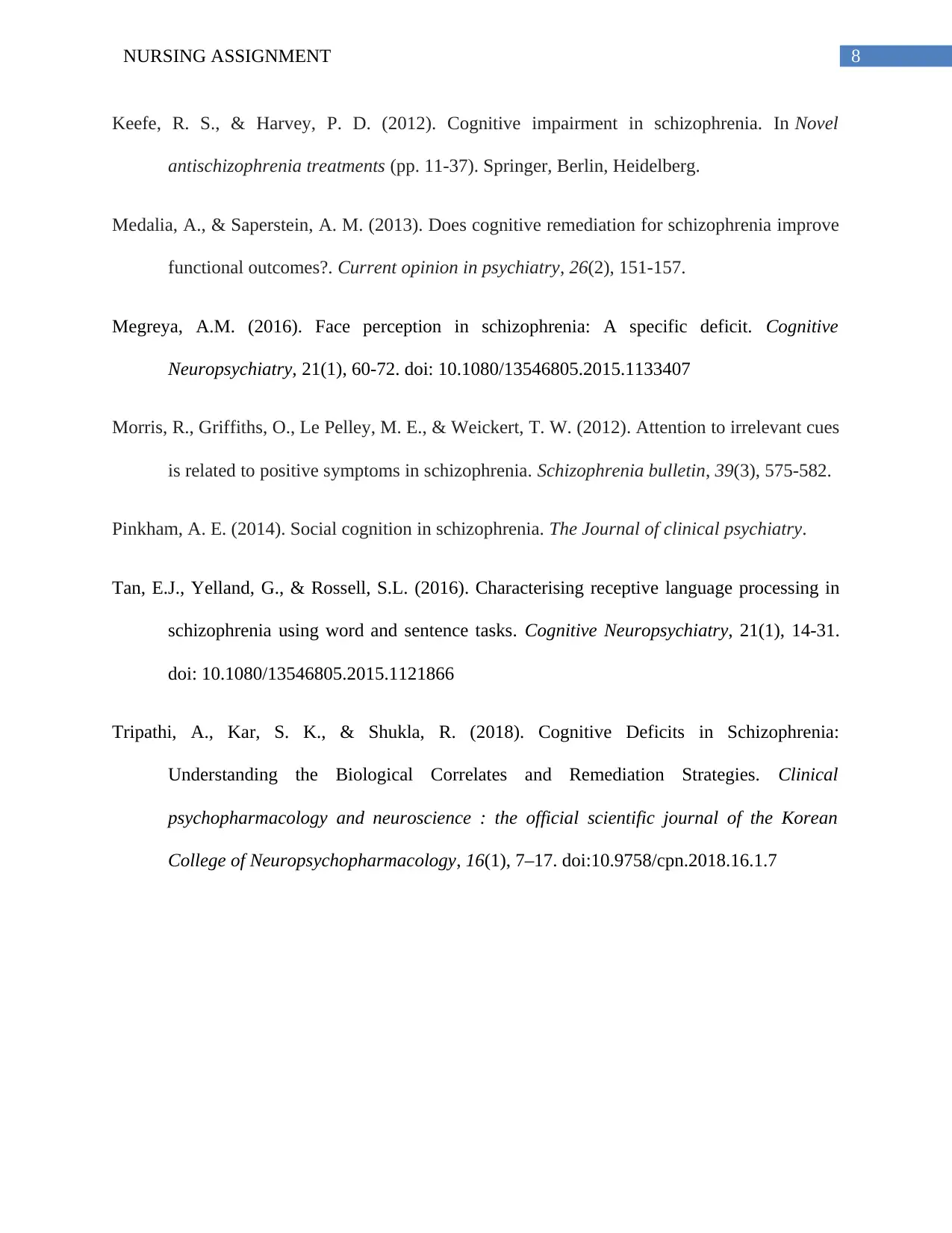
8NURSING ASSIGNMENT
Keefe, R. S., & Harvey, P. D. (2012). Cognitive impairment in schizophrenia. In Novel
antischizophrenia treatments (pp. 11-37). Springer, Berlin, Heidelberg.
Medalia, A., & Saperstein, A. M. (2013). Does cognitive remediation for schizophrenia improve
functional outcomes?. Current opinion in psychiatry, 26(2), 151-157.
Megreya, A.M. (2016). Face perception in schizophrenia: A specific deficit. Cognitive
Neuropsychiatry, 21(1), 60-72. doi: 10.1080/13546805.2015.1133407
Morris, R., Griffiths, O., Le Pelley, M. E., & Weickert, T. W. (2012). Attention to irrelevant cues
is related to positive symptoms in schizophrenia. Schizophrenia bulletin, 39(3), 575-582.
Pinkham, A. E. (2014). Social cognition in schizophrenia. The Journal of clinical psychiatry.
Tan, E.J., Yelland, G., & Rossell, S.L. (2016). Characterising receptive language processing in
schizophrenia using word and sentence tasks. Cognitive Neuropsychiatry, 21(1), 14-31.
doi: 10.1080/13546805.2015.1121866
Tripathi, A., Kar, S. K., & Shukla, R. (2018). Cognitive Deficits in Schizophrenia:
Understanding the Biological Correlates and Remediation Strategies. Clinical
psychopharmacology and neuroscience : the official scientific journal of the Korean
College of Neuropsychopharmacology, 16(1), 7–17. doi:10.9758/cpn.2018.16.1.7
Keefe, R. S., & Harvey, P. D. (2012). Cognitive impairment in schizophrenia. In Novel
antischizophrenia treatments (pp. 11-37). Springer, Berlin, Heidelberg.
Medalia, A., & Saperstein, A. M. (2013). Does cognitive remediation for schizophrenia improve
functional outcomes?. Current opinion in psychiatry, 26(2), 151-157.
Megreya, A.M. (2016). Face perception in schizophrenia: A specific deficit. Cognitive
Neuropsychiatry, 21(1), 60-72. doi: 10.1080/13546805.2015.1133407
Morris, R., Griffiths, O., Le Pelley, M. E., & Weickert, T. W. (2012). Attention to irrelevant cues
is related to positive symptoms in schizophrenia. Schizophrenia bulletin, 39(3), 575-582.
Pinkham, A. E. (2014). Social cognition in schizophrenia. The Journal of clinical psychiatry.
Tan, E.J., Yelland, G., & Rossell, S.L. (2016). Characterising receptive language processing in
schizophrenia using word and sentence tasks. Cognitive Neuropsychiatry, 21(1), 14-31.
doi: 10.1080/13546805.2015.1121866
Tripathi, A., Kar, S. K., & Shukla, R. (2018). Cognitive Deficits in Schizophrenia:
Understanding the Biological Correlates and Remediation Strategies. Clinical
psychopharmacology and neuroscience : the official scientific journal of the Korean
College of Neuropsychopharmacology, 16(1), 7–17. doi:10.9758/cpn.2018.16.1.7
⊘ This is a preview!⊘
Do you want full access?
Subscribe today to unlock all pages.

Trusted by 1+ million students worldwide
1 out of 9
Your All-in-One AI-Powered Toolkit for Academic Success.
+13062052269
info@desklib.com
Available 24*7 on WhatsApp / Email
![[object Object]](/_next/static/media/star-bottom.7253800d.svg)
Unlock your academic potential
Copyright © 2020–2026 A2Z Services. All Rights Reserved. Developed and managed by ZUCOL.
